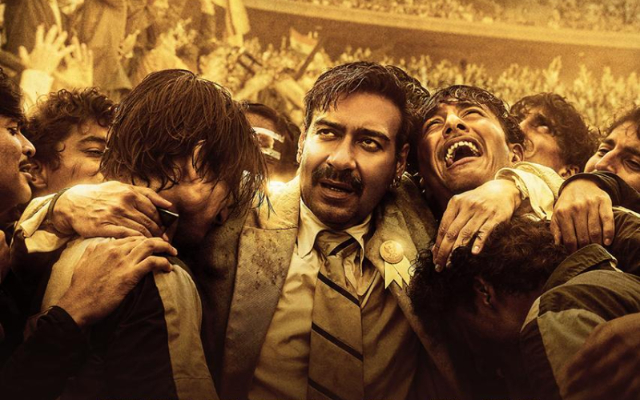
The late, great PK Banerjee had narrated the story to this correspondent. After returning from the 1962 Asian Games, the gold medal-winning Indian football team was invited to the IFA office in Calcutta where Atulya Ghosh, a powerful Congress leader in the 1960s, welcomed them. The players received a pat on the back, tea and biscuits were served, and that was that.
No player had the ‘temerity’ to ask for cash rewards, for that would have been construed as indiscipline. As Banerjee had said, they never thought about cash rewards even. “We played for the Tricolour.”
In 1962, only after 15 years of independence, India was a young nation and patriotism was still en vogue. Patriotism is at the heart of the Ajay Devgan-starrer Maidaan that tells the inspiring real-life story of Syed Abdul Rahim, a football coach, who galvanised a young team and took Indian football to unprecedented heights in the 1950s and 60s. Winning the gold medal at the 1962 Asiad in Jakarta was the crowning glory.
Rahim was a patriot, and his wards, Chuni Goswami, PK Banerjee, Tulsidas Balaram, Jarnail Singh, Peter Thangaraj and others played for the badge. No wonder that Maidaan is a marriage between a spontaneous cheer and a joyous tear.
Through the now-forgotten figure of Rahim, Maidaan, also, takes us back to a time when a group of supremely talented footballers made the game the country’s joie de vivre. It makes us nostalgic and at the same time, evokes sadness of what could have been. 1962 could have been Indian football’s 1983.
For the Latest Sports News: Click Here
🚨Behind the Scenes || Maidaan
Selecting 11 players from 7000 faces, a year of intense training, and more – delve into the behind-the-scenes sweat, pain, and hard work that culminated in the masterpiece film, Maidaan.
@ajaydevgn #PriyamaniRaj @raogajraj @BoneyKapoor… pic.twitter.com/tN8aEAk4Kf— RevSportz (@RevSportz) April 12, 2024
It didn’t happen because of administrative apathy; a group of administrators with vested interest, who didn’t even think about using the success as a platform and building on it. Maidaan showed how an all-powerful football administrator (played by Rudranil Ghosh) back then tried to make life difficult for Rahim, in conjunction with an influential football writer (played by Gajraj Rao).
The Indian government was initially reluctant to send the football team to the 1962 Asian Games and the go-ahead was given only after the gold medal promise was made. Administrative ineptitude continues in Indian football. A collective apathy towards the sport acts an additional deterrent.
Rewind to the 1960s’ world, Asia to be precise. Japan was rising from the ashes of Hiroshima and Nagasaki. Korea was recovering from a bitter Korean War. China was an underdeveloped country. And the Middle East didn’t yet become oil-rich. India was a top power in Asian football and had an open field to cement its authority.
In 1983, after India won the cricket World Cup, the administrators governing the game in the country ensured that the success would sow the seeds of a change in the world order. World Cup hosting was taken out of the Blighty and gradually the power centre of cricket shifted to the subcontinent.

1962 was Indian football’s big opportunity that was deplorably wasted. The carry-over effect of the triumph continued until 1970, when India won a bronze medal at the Bangkok Asian Games. After that, Indian football steadily slipped into a deep dark dungeon. The blame lay at the feet of inefficient administrators and some political leaders, cutting across party lines, who tried to influence the sport.
Have things changed in 2024? Only last month, India played a double-leg Fifa World Cup qualifier against Afghanistan. The first leg in Abha, Saudi Arabia, was a goalless draw, while the hosts lost the return leg in Guwahati 2-1.
The All India Football Federation was supposed to arrange a charter flight for the Indian team from Abha to Guwahati. However, the plan was shelved and the team had to take three commercial flights to return home. The Afghanistan team reached Guwahati before their Indian counterparts.
“For your information, we didn’t come here in a charter flight,” Igor Stimac, the Indian team head coach, told reporters in Guwahati. The visitors had an extra day of rest and they made that count on the pitch. For India, the defeat has seriously jeopardised their chances of reaching the third round of the World Cup qualifiers. But it’s not always the players’ fault.
Also Read: Maidaan extends SA Rahim’s journey in football fans’ collective consciousness




